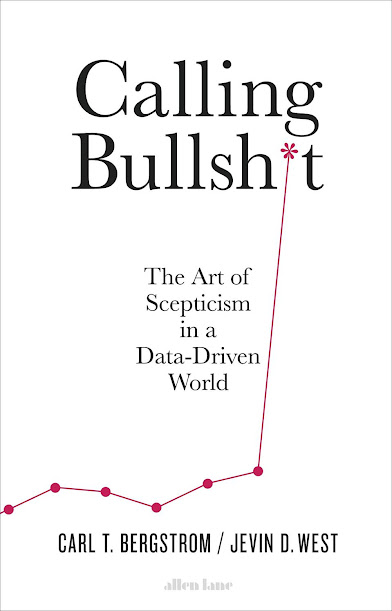Calling Bullsh*t - By Carl Bergstrom & Jevin West — Review - Aug 28, 2020 - GrrlScientist
A useful and
accessible guide to how to think critically about the information and research
that we read about in the news and on social media.
“Nothing that you
will learn in the course of your studies will be of the slightest possible use
to you [thereafter], save only this, that if you work hard and intelligently
you should be able to detect when a man is talking rot, and that, in my view,
is the main, if not sole, purpose of education.” —
Idealist philosopher John Alexander Smith (1863 – 1939).
Spin. Fake News. Conspiracy theories. Lies. We are daily confronted with a
stinking quagmire of misinformation, disinformation and fact-free drivel. How
do we sort the truth from the lies? This is the premise of the timely new book,
Calling Bullshit: The Art of Skepticism in a
Data-Driven World (Allen Lane/Random
House, 2020), a book that effectively acts as a field guide to the
art of critical thinking.
The authors
are expert guides. Carl Bergstrom is a theoretical and evolutionary biologist
who researches how information flows through biological and social networks.
Jevin West is a data scientist who studies misinformation in science and
society. Together, they teach a popular undergraduate class offered under the
same name by the University of Washington.
This book, a
distillation of that course, presents a mix of amusing anecdotes, timely news
stories and accessible explanations of scientific and medical data. You do not
need to be a professional statistician or some other sort of mathematical
wizard, nor must you invest weeks into fact-checking to see through most nonsense.
Instead, the authors argue, assessing the accuracy of a particular claim using
basic logic, augmented (where necessary) with information that can be easily
retrieved by an online search engine is sufficient to “call bullshit”.
So why bother
“calling bullshit”? As the authors assert, adequate bullshit detection is
essential for the survival of democracy. Regardless of political ideologies,
democracy has always relied on a critically thinking electorate, and this
intellectual skill is more important than ever in this modern age of online
information warfare. It also is critically important for proper functioning of
any social group, whether it is a small group of friends or some other social
group, or a professional community.
This book
teaches us how to identify the various forms of new-school bullshit: how to
evaluate scientific claims, to distinguish between correlation and causation,
to recognize biased and unrepresentative data and small sample sizes, to identify
selection biases in samples, to understand how data can be manipulated
visually, and more. They also include lots of graphs and other data images so
you can practice spotting screwy data representations yourself. Whether you are
confused by the anti-vax movement, which grew out of a single retracted medical
study, to the claim that Artificial Intelligence can infer sexual orientation
from analyzing a photograph of a person’s face, there is no shortage of nutty
ideas out there to contemplate and dissect.
The book ends
with two empowering chapters on how to spot and refute nonsense and, more
importantly, how to do so in a useful and constructive way.
Ironically,
despite the authors’ assertion that proper fact-checking is essential, the book
only has an alphabetized reference list for each chapter in the back of the
book, leaving interested readers to scratch their collective heads as they try
to deduce which statement should be attributed to which source. And although
mistakes do inevitably creep in during the writing and editing process, I was
surprised that the letter M in the commonly used acronym, STEM, was erroneously
attributed to medicine, instead of mathematics. And yes, I was disappointed by
the poor quality paper that the book was printed on.
Despite my
complaints (some of which are probably beyond the authors’ control), Calling Bullshit presents
a thoughtful, careful and often amusing deconstruction about how to spot and
disprove nonsense. It should be required reading for high school and university
students as well as for any thinking person trying to make sense of these weird
times and who is working to identify questionable news sources and stories, and
navigate their way around social media.
Credits www.forbes.com
See also video lessons: Calling Bullshit - Spring
2017 .
---
---


